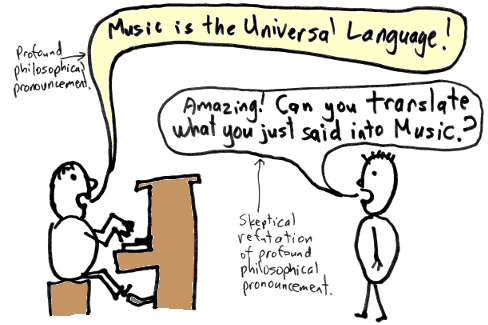Speech vs. Music in Neural Processing


Humans are born with the ability to both make music and speak. The idea that these abilities are separate is largely debated. Many say that our natural disposition for music comes from our ability to speak, or vice versa. Several components of language such as intonation and rhythm were things that we adapted for speech and communication. These same things may be the reason we can create music.
It has been shown that the right hemisphere of the brain is responsible for interpreting melody and the left comprehends words. Somehow, the brain easily separates the “music” from and song and its lyrics. When we listen to a lyrical song, both sides of our brain are active, which is why we often enjoy songs with lyrics more than ones without. After all, they are the most common musical style today.
There is extensive evidence that music and speech are processed by the same brain systems. The first system is based on the frontal lobes. It helps us unconsciously learn and use the rules that both language and music follow. For example, syntax rules that we automatically know and follow when speaking are processed by the same system as the rules of harmony and dissonance in music. Additionally, another system based in the temporal lobe helps us retain information like definitions of words and familiar melodies.
In the single component of rhythm, we find several connections between music and language. A recent study focused on the pulsating of a study participants’ eyes. They found that their participants’ eyes pulsated to a beat not just when listening to music, but also when having conversations and listening to people speaking. This suggested that the brain treated both stimuli similarly and used the same mechanisms to process both. A Finnish study found that young children with a better aptitude for music were better at phonics and pronunciation exercises for their age. This suggests and further proves the idea that the neural pathways for both language and music are similar.
A recent study has brought about the idea that musical ability is necessary for linguistic competence. The study suggests that the musical components of spoken language (pitch, rhythm, etc.) are what infants learn and notice first. Knowing that music is essentially combinations of sounds that have rhythms and pitches, we can describe language as a type of music.
Music and language are both necessary to our intelligence as a species. While they have been previously treated as separate domains, the evidence shows that they may not be as different as expected.
- Brandt, Anthony, et al. “Music and Early Language Acquisition.” Frontiers in Psychology, Frontiers Research Foundation, 11 Sept. 2012, http://www.ncbi.nlm.nih.gov/pmc/articles/PMC3439120/.
- Hamilton, Jon. “Scientists Find Speech And Music Live On Opposite Sides Of The Brain.” NPR, NPR, 27 Feb. 2020, http://www.npr.org/2020/02/27/810095481/scientists-find-speech-and-music-live-on-opposite-sides-of-the-brain.
- “Link between Music and Speech Rhythm in Brain Could Provide Language Insight.” Horizon, horizon-magazine.eu/article/link-between-music-and-speech-rhythm-brain-could-provide-language-insight.html-0.
- “Music And Language Are Processed By The Same Brain Systems.” ScienceDaily, ScienceDaily, 28 Sept. 2007, http://www.sciencedaily.com/releases/2007/09/070927121101.htm.
- Peretz, Isabelle, et al. “Neural Overlap in Processing Music and Speech.” Philosophical Transactions of the Royal Society of London. Series B, Biological Sciences, The Royal Society, 19 Mar. 2015, http://www.ncbi.nlm.nih.gov/pmc/articles/PMC4321131/.
- Tsoulas, George. “Explainer: How Are Learning Languages and Music Linked?” The Conversation, 9 Apr. 2020, theconversation.com/explainer-how-are-learning-languages-and-music-linked-34325.


One Response
There are some ideas about using music for speech therapy. This post is perfect introduction and shows the connections that can be made. Love it!